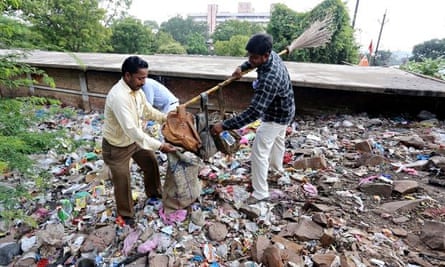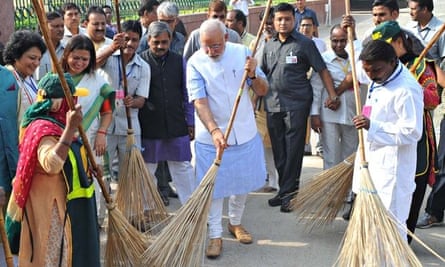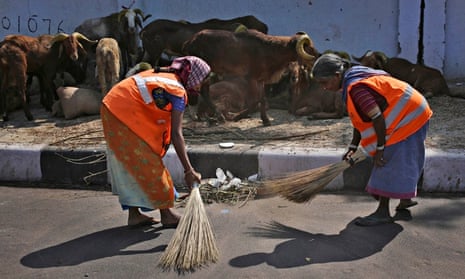Haresh Gandhi, the manager of Delhi’s Hazrat Nizamuddin railway station, is having a busy week. The 46-year-old bureaucrat has 200 trains and 200,000 passengers to take care of every day. However, for the past 72 hours he has had another goal: to get his sprawling, overcrowded station clean.
“This is something we are doing not just for India but for the planet. The whole world needs to come together. Everybody needs to do it,” Gandhi said.
Narendra Modi, the newly elected prime minister of India, launched a campaign on Thursday – the Swachh Bharat Abhiyan, or Clean India Mission – enjoining his countrymen to pick up brooms, pans and brushes and set about sweeping streets, parks and other public places.
Modi chose the birth anniversary of Mohandas Karamchand Gandhi, the revered independence leader, to launch the five-year drive, which also aims to provide hundreds of millions with toilets.
The 64-year-old politician, who has long made cleanliness and hygiene a prominent theme in his speeches, called on compatriots not to “let India remain unclean any longer” earlier this week.
“We are not good at it compared with other countries, but we must try,” said Gandhi, the station manager.
Although 2 October is usually a public holiday, Modi, who won a landslide victory in May, ordered officials in India’s massive bureaucracy to report for duty and pledge to clean their places of work.
Across the country, groups of people could be seen with pans, brooms and brushes. One group swept the pavements of Delhi’s upmarket Golf Links neighbourhood. Another tackled the spit-spattered stairwell of a large ministry.

At Nizamuddin station, all 1,600 staff had worked in shifts for three days to clean away the piles of food wrappers, plastic tea cups, betel nut stains and plastic that usually greet passengers. A usually reeking toilet smelt of soap.
“I must have done 1,000 hours. We have to keep it going, though. There has to be people’s participation,” said Shelly Srivastava, who works at the Delhi division office of India’s railways.
Modi led the Bharatiya Janata party to power on a pledge of accelerating economic development and has shown an unerring instinct for issues that concern and mobilise “middle India”.
“This is not politics, but patriotism”, Modi, a former organiser of a revivalist religious organisation, told reporters at the launch of the campaign this morning.
Though criticised for a lack of “big bang” measures to boost flagging growth, the prime minister has consistently attacked entrenched hierarchies and values that many blame for India’s patchy development and continuing deep inequality.
One is the enduring social hierarchy known as the caste system. So-called “upper castes” have long refused to perform many menial tasks that they say are the lot of those at the bottom of the ladder.
After the rally in the centre of Delhi, Modi, who is himself from a low caste background, visited a slum neighbourhood inhabited by a community of cleaners, where he took a broom and swept a portion of road.

“In a country like India where there is caste and class discrimination, he has given a sign that everyone should be involved and this is a radical departure,” said Dr Bindeshwar Pathak, a pioneering campaigner on sanitation. “We have never before seen politicians and bureaucrats sweeping the streets.”
The neighbourhood Modi visited is home to members of the Valmiki caste, whose occupation is traditionally “manual scavenging”, a euphemism for clearing other people’s faeces by hand.
“Don’t we all have a duty to clean the country?” the prime minister said.
Particularly in urban environments, caste hierarchies are breaking down. “Much has changed … these barriers, gulfs are being bridged. We are all Indian,” said Srivastava, the railway official.
“I have seen a big change in my lifetime,” said Dr Pathak, who is 71.
The new campaign also aims to build sufficient toilets to end the problem of “open defecation”.
Unicef estimates that almost 594 million – or nearly 50% of India’s population – relieve themselves in fields, woods or rivers, mostly in poor rural areas.
Around 300 million women and girls are forced to squat outside, usually under the cover of darkness, exposed not only to the risks of disease and bacterial infection, but also harassment and assault by men.
The issue was highlighted earlier this year when two girls, aged 12 and 14, were found hanged after they went into the fields after dark in Uttar Pradesh. Police are investigating if they had been gang-raped before being killed.
A World Bank report estimated that India lost the equivalent of 6.4% of GDP in 2006 from poor access to sanitation. Investment in infrastructure of all kinds has not kept up with rising population and demand.
Neeraj Jain, chief executive of WaterAid India, said at least 186,000 children under the age of five in the country died every year from diseases caused by unsafe water and poor sanitation.
There are also concerns about the spread of antibiotic resistant bacteria in India.
The new campaign is expected to cost 620bn rupees (£6.1bn), with three quarters coming from the corporate sector, international development organisations and elsewhere.
Gandhi, the station manager, said cleaning the platforms, concourse and crowded approaches had been a mammoth task but that he hoped to continue the effort.
“I will not be doing it myself, of course. I have a station to run. But I will be paying very great attention. This is a very important issue,” he said.

Comments (…)
Sign in or create your Guardian account to join the discussion